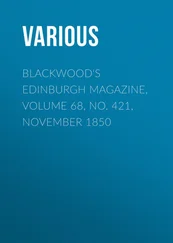Various - Blackwood's Edinburgh Magazine, Vol. 66, No 409, November 1849
Здесь есть возможность читать онлайн «Various - Blackwood's Edinburgh Magazine, Vol. 66, No 409, November 1849» — ознакомительный отрывок электронной книги совершенно бесплатно, а после прочтения отрывка купить полную версию. В некоторых случаях можно слушать аудио, скачать через торрент в формате fb2 и присутствует краткое содержание. Издательство: Иностранный паблик, Жанр: periodic, foreign_edu, Путешествия и география, на английском языке. Описание произведения, (предисловие) а так же отзывы посетителей доступны на портале библиотеки ЛибКат.
- Название:Blackwood's Edinburgh Magazine, Vol. 66, No 409, November 1849
- Автор:
- Издательство:Иностранный паблик
- Жанр:
- Год:неизвестен
- ISBN:нет данных
- Рейтинг книги:3 / 5. Голосов: 1
-
Избранное:Добавить в избранное
- Отзывы:
-
Ваша оценка:
- 60
- 1
- 2
- 3
- 4
- 5
Blackwood's Edinburgh Magazine, Vol. 66, No 409, November 1849: краткое содержание, описание и аннотация
Предлагаем к чтению аннотацию, описание, краткое содержание или предисловие (зависит от того, что написал сам автор книги «Blackwood's Edinburgh Magazine, Vol. 66, No 409, November 1849»). Если вы не нашли необходимую информацию о книге — напишите в комментариях, мы постараемся отыскать её.
Blackwood's Edinburgh Magazine, Vol. 66, No 409, November 1849 — читать онлайн ознакомительный отрывок
Ниже представлен текст книги, разбитый по страницам. Система сохранения места последней прочитанной страницы, позволяет с удобством читать онлайн бесплатно книгу «Blackwood's Edinburgh Magazine, Vol. 66, No 409, November 1849», без необходимости каждый раз заново искать на чём Вы остановились. Поставьте закладку, и сможете в любой момент перейти на страницу, на которой закончили чтение.
Интервал:
Закладка:
"The new emigrants, who at various times continued to flock to the extensive country of America, were by no means of the same description with the first settlers. Some of these were the scourings of jails, banished for their crimes; many of them were persons of desperate fortunes, to whom every place was equally uninviting; or men of notoriously abandoned lives, to whom any region was acceptable that offered them a shelter from the vengeance of the law, or the voice of public indignation. But a change of scene will work some improvement upon the most dissolute of characters. It is much to be removed from the scenes with which villany has been constantly associated, and the companions who have rendered it agreeable. It is something to have the leisure of a long voyage, with its awakening terrors, to promote reflection. Besides, to regain once more the privilege of that good name, which every unknown man may claim until he is tried, presents a powerful temptation to reform, and furnishes an opportunity of amendment denied in the scenes of exposure and destruction. If the convicts in the colony of New Holland, though surrounded on the voyage and in the settlement by the companions of their iniquities, have in a great degree been reclaimed by the mere change of scene, what might not be expected from such a change as we are considering? But the honest acquisition of a little property, and its attendant importance, is, beyond any other circumstance, the one most calculated to reform the conduct of a needy and profligate man, by inspiring him with a respect for himself and a feeling of his stake in the community, and by putting a harmless and comfortable life at least within the reach of his exertions. If the property is of a nature to require constant industry, in order to render it of any value; if it calls forth that sort of industry which devotes the labourer to a solitary life in the open air, and repays him not with wealth and luxury, but with subsistence and ease; if, in short, it is property in land, divided into small portions and peopled by few inhabitants, no combination of circumstances can be figured to contribute more directly to the reformation of the new cultivator's character and manners." 5 5 Brougham's Colonial Policy , i. 61, 62.
In addition to these admirable observations, it may be stated, as another, and perhaps the principal reason why transportation, when conducted on proper principles, is attended with such immediate and beneficial influences on the moral character of the convict, that it places him in situations where scope is afforded for the development of the domestic and generous affections . A counterpoise is provided to self. It is the impossibility of providing such a counterpoise within the four walls of a cell – the extreme difficulty of finding it, in any circumstances in which a prisoner can be placed, on his liberation from jail in his own country, which is the chief cause of the total failure of all attempts to work a moral reform on prisoners, when kept at home, by any, even the most approved system of jail discipline. But that which cannot be obtained at home is immediately, on transportation, found in the colonies. The criminal is no longer thrown back on himself in the solitude of a cell – he is not surrounded by thieves and prostitutes, urging him to resume his old habits, on leaving it. The female convict, on arriving in New South Wales, is almost immediately married; ere long the male, if he is industrious and well-behaved, has the means of being so. Regular habits then come to supplant dissolute – the natural affections spring up in the heart with the creation of the objects on which they are to be exercised. The solitary tenant of a cell – the dissolute frequenter of spirit-cellars and bagnios, acquires a home . The affections of the fireside begin to spring up, because a fireside is obtained.
Incalculable is the effect of this change of circumstances on the character of the most depraved. Accordingly it is mentioned by Mr Cunningham, in his very interesting Account of New South Wales , that great numbers of young women taken from the streets of London, who have resisted all efforts of Christian zeal and philanthropy in Magdalene Asylums or Penitentiaries at home, and embark for New South Wales in the most shocking state of depravity, become sensibly improved in their manners, and are not unfrequently entirely reformed by forming, during the voyage, temporary connections with sailors , to whom, when the choice is once made, they generally remain faithful: so powerful and immediate is the effect of an approach even to a home, and lasting ties, on the female heart. 6 6 Cunningham's New South Wales , i. 262.
The feelings which offspring produces are never entirely obliterated in the breast of woman. It has been often observed, that though dissolute females generally, when they remain at home, find it impossible to reform their own lives, yet they rarely, if they have the power, fail to bring up their children at a distance from their haunts of iniquity. So powerful is the love of children, and the secret sense of shame at their own vices, in the breasts even of the most depraved of the female sex.
It has been proved, accordingly, by experience, on the very largest scale, not only that the reformation of offenders, when transported to a colony in a distant part of the world, takes place, if they are preserved in a due proportion of numerical inferiority to the untainted population , to an extent unparalleled in any other situation; but that, when so regulated, they constitute the greatest possible addition to the strength, progress, and riches of a colony . From official papers laid before parliament, before the unhappy crowding of convicts in New South Wales began, and the gang-system was introduced, it appears that between the years 1800 and 1817 – that is, in seventeen years – out of 17,000 convicts transported to New South Wales, no less than six thousand had, at the close of the period, obtained their freedom from their good conduct, and had earned among them, by their free labour, property to the amount of £1,500,000 ! It may be safely affirmed that the history of the world does not afford so astonishing and gratifying an instance of the moral reformation of offenders, or one pointing so clearly to the true system to be pursued regarding them. It will be recollected that this reformation took place when 17,000 convicts were transported in seventeen years – that is, on an average, 1000 a-year only – and when the gang-system was unknown, and the convict on landing at Sidney was immediately assigned to a free colonist, by whom he was forthwith marched up the country into a remote situation, and employed under his master's direction in rural labour or occupations.
And that the colony itself prospers immensely from the forced labour of convicts being added, in not too great proportions , to the voluntary labour of freemen, is decisively proved by the astonishing progress which Australia has made during the last fifty years; the degree in which it has distanced all its competitors in which convict labour was unknown; and the marvellous amount of wealth and comfort, so much exceeding upon the whole that known in any other colony, which now exists among its inhabitants. We say upon the whole, because we are well aware that in some parts of Australia, particularly Van Diemen's Land, property has of late years been most seriously depreciated in value – partly from the monetary crisis, which has affected that distant settlement as well as the rest of the empire, and partly from the inordinate number of convicts who have been sent to that one locality, from the vast increase of crime at home, and the cessations of transportation to Sidney; – a number which has greatly exceeded the proper and salutary proportion to freemen, and has been attended with the most disastrous results. But that the introduction of convicts, when not too depraved, and kept in due subordination by being in a small minority compared to the freemen , is, so far from being an evil, the greatest possible advantage to a colony, is decisively proved by the parliamentary returns quoted below, showing the comparative progress during a long course of years of Australia, aided by convict labour, and the Cape of Good Hope and Canada, which have not enjoyed that advantage. These returns are decisive. They demonstrate that the progress of the convict colonies, during the last half century, has been three times as rapid as that of those enjoying equal or greater advantages, to whom convicts have not been sent; and that the present state of comforts they enjoy, as measured by the amount per head of British manufactures they consume, is also triple that of any other colony who have been kept entirely clear from the supposed stain, but real advantages, of forced labour. 7 7 Table showing the annual exports of British manufactures to the undermentioned Colonies, from 1828 to 1846.
Интервал:
Закладка:
Похожие книги на «Blackwood's Edinburgh Magazine, Vol. 66, No 409, November 1849»
Представляем Вашему вниманию похожие книги на «Blackwood's Edinburgh Magazine, Vol. 66, No 409, November 1849» списком для выбора. Мы отобрали схожую по названию и смыслу литературу в надежде предоставить читателям больше вариантов отыскать новые, интересные, ещё непрочитанные произведения.
Обсуждение, отзывы о книге «Blackwood's Edinburgh Magazine, Vol. 66, No 409, November 1849» и просто собственные мнения читателей. Оставьте ваши комментарии, напишите, что Вы думаете о произведении, его смысле или главных героях. Укажите что конкретно понравилось, а что нет, и почему Вы так считаете.












